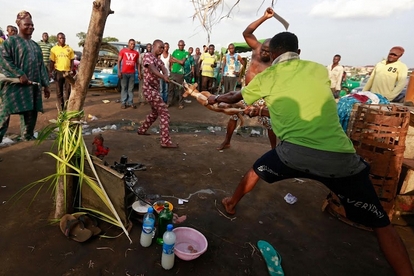
support@yorubalibrary.com
+2348073529208, 07038599574

The Ogun Festival is one of the most important and vibrant traditional festivals celebrated by the Yoruba people. Dedicated to Ogun, the god of iron and war, this festival is steeped in cultural, historical, and spiritual significance. It serves as a powerful expression of Yoruba heritage and a testament to the enduring legacy of Ogun in Yoruba culture.
The Significance of Ogun in Yoruba Culture
Ogun is a prominent deity in the Yoruba pantheon, revered as the god of iron, war, and labor. He is considered the patron of blacksmiths, hunters, warriors, and all who work with metal. Ogun's influence extends beyond his association with iron; he is seen as a protector, a provider of strength and courage, and a figure who embodies justice and perseverance.
Historical Origins of the Ogun Festival
The Ogun Festival has ancient roots, tracing back to the early days of the Yoruba civilization. Traditionally held to honor Ogun and seek his blessings, the festival also commemorates historical events and legendary feats attributed to the deity. It is believed that Ogun played a crucial role in the founding of many Yoruba towns and the establishment of social order through his mastery of iron and warfare.
Key Components of the Ogun Festival
1. Ritual Preparations
Shrine Cleansing and Decoration: The festival preparations begin with the cleaning and decoration of Ogun's shrine. This sacred space is adorned with iron objects, palm fronds, and offerings.
Animal Sacrifice: Traditionally, dogs are sacrificed to Ogun. These offerings are meant to appease the deity and ensure his favor and protection.
2. Ceremonial Processions
Parade of Warriors and Blacksmiths: Participants, often dressed as warriors and blacksmiths, parade through the town. They carry iron tools and weapons, symbolizing Ogun's dominion over iron and warfare.
Masquerades and Drummers: The processions are accompanied by vibrant masquerades and traditional drummers, creating an atmosphere of festivity and reverence.
3. Traditional Performances
Oriki (Praise Poetry): Oral poets recite Oriki, or praise poetry, in honor of Ogun. These poetic renditions recount Ogun's heroic deeds and his importance in Yoruba mythology.
Dancing and Music: Traditional dances and music are integral to the festival. Dancers perform vigorous movements to the rhythm of drums, celebrating Ogun's strength and vitality.
4. Feasting and Communal Meals
Sharing of Sacrificial Meat: The meat from the sacrificed animals is cooked and shared among participants, symbolizing communal unity and the blessings of Ogun.
Preparation of Traditional Dishes: Special dishes, such as pounded yam and palm wine, are prepared and enjoyed by the community.
5. Spiritual Activities
Prayers and Divination: Priests and community elders lead prayers and perform divination to seek Ogun's guidance and blessings for the coming year.
Libations: Libations of palm wine and other liquids are poured on the ground as offerings to Ogun, asking for his protection and favor.
The Role of Ogun Festival in Yoruba Society
The Ogun Festival is more than a religious observance; it is a communal event that reinforces social bonds, cultural identity, and continuity. It provides an opportunity for the community to come together, celebrate their shared heritage, and pass down traditions to younger generations.
1. Cultural Preservation
The festival plays a crucial role in preserving Yoruba cultural practices, from traditional music and dance to rituals and ceremonies.
2. Economic Impact
The festival attracts visitors from within and outside the Yoruba community, boosting local economies and promoting cultural tourism.
3. Social Cohesion
By bringing together different segments of society, the festival fosters a sense of unity and collective identity.
Modern Adaptations and Challenges
While the core traditions of the Ogun Festival remain intact, modern influences have introduced changes to its celebration. These include:
1. Integration of Modern Elements
Incorporating contemporary music and performances alongside traditional acts.
Utilizing media and technology to promote the festival and reach a wider audience.
2. Challenges of Urbanization
The shift from rural to urban settings poses challenges in maintaining the authenticity and communal spirit of the festival.
3. Balancing Tradition and Modernity
Ensuring that the festival evolves with the times while preserving its essential cultural and spiritual elements.
Conclusion
The Ogun Festival is an elaborate celebration of Yoruba culture and spirituality, honoring one of the most revered deities in the Yoruba pantheon. Through its rich rituals, performances, and communal activities, the festival not only pays homage to Ogun but also reinforces the cultural heritage and unity of the Yoruba people. By adapting to modern influences while preserving its core traditions, the Ogun Festival continues to thrive as a vital expression of Yoruba identity and community.

Learn about the Yoruba concept of Ìwà Pẹ̀lẹ́ (good…

Learn special praises for Divine Being and Creator…